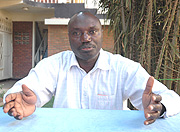The New Times’ RWEMBEHO STEPHEN attended an Education Quality (Edqual) workshop in Kigali Institute of Education, where scholars were brainstorming on how to use ICT in teaching science and mathematics. The two leaders of the project, Dr. Paul Denley and Alphonse Uworwabayeho had long discussion with him and here is the storyExcerpts:


The New Times’ RWEMBEHO STEPHEN attended an Education Quality (Edqual) workshop in Kigali Institute of Education, where scholars were brainstorming on how to use ICT in teaching science and mathematics. The two leaders of the project, Dr. Paul Denley and Alphonse Uworwabayeho had long discussion with him and here is the story Excerpts:
Can you tell us about Edqual?
Alphonse Uworwabayeho: EdQual is a five year collaborative research programme that aims to design and pilot initiatives to improve the quality of basic education.
Cross-cutting issues include: raising gender awareness, meeting the needs of disadvantaged learners, remote and overcrowded schools. Our research is led by institutions in Ghana, Tanzania, South Africa, Bristol (UK) and Rwanda. EdQual in Rwanda is run by Kigali Institute of Education (KIE).
What are the aims of EdQual ?
Dr, Paul Denley: Our overall aim is to address the most significant factor affecting learner performance which is mainly teacher quality. The research is unequivocal: the conceptual knowledge of our teachers is low; teachers have a poor grasp of the subjects they teach and there is a high level of teacher error in the content and concepts presented in science lessons.
Teachers have low expectations of learners (particularly poor learners) who then achieve to these low expectations and motivation and challenge is reduced.
Whether curriculum changes that have been introduced are ‘good’ or ‘bad’ is less important than building the professional confidence of teachers, and excellence in teaching.
How do we improve quality? The most important investment we can make is to provide for teachers to select from a range of academically rigorous learning opportunities of high quality that are credible and useful to them and which will build their own literacy and confidence in the subject matter they teach; which will deepen their understanding of curriculum and pedagogy; and which will excite them about learner potential.
In pursuing these opportunities, they must have sufficient time to read, think and write, and to reflect on their practice.
How do you expect to help Rwandan teachers to use ICT in teaching science and mathematics?
Uworwabayeho: The use of computers for example to teach geometry in mathematics drives away students fear.
The complex drawings are done by the machine and everything comes as a game. This is when learners realize that mathematics is not as difficult and complex as they think. In addition we teach students and teachers how to use the internet to research.
Why do you think there has been slow scientific development in developing countries?
Denley: It is true that the science taught on this part of the world is based on discoveries and this what some people would like to call, "teaching the history of science”.
It has also been wrong to explain the quality of education in school at the level of an individual teacher or classroom. I say this is because quantitative numbers have been the measures of quality.
That is quality based on the number of years you spend in school for example. You know the assumption was that the longer you stayed in school, the higher the quality you attained. And this is a very wrong conception.
We are today, set to go closer to classrooms and help teachers offer the required skills. Instead of teachers teaching new scientific discoveries, they should be able to go for what the learners need in their daily life.
Learners should have a sound knowledge on climate change, HIV/AIDS, nutrients, etc. Otherwise how will people know how much calories, they are supposed to eat a day. This is simple but fundamental scientific knowledge.
What do you see as a great challenge of teaching science in Rwanda using ICT?
Uworwabayeho: Of course a number of challenges are still in place and can be viewed in different perspectives.
Teachers have not mastered for instance, the best methods of teaching mathematics using ICT. A lot of training is thus needed to give the required skills to the teachers.
And in addition, enough time should be given to teachers to prepare for these lessons. You know actual teaching of mathematics and science using ICT, takes a relatively short time but its preparation, takes a number of hours.
So, the fact that a teacher has fixed working hours as per his or her work load makes the process of teaching and learning mathematics and science, cumbersome.
But we are optimistic that at some point, things will work out.
What would you recommend then?
Uworwabayeho: We have got to move away from teaching theories about science and be practical. Our science is only in books.
Unfortunately too, we have conservative science teachers who feel what they learnt in so many years ago is enough.
They have hence continued to rely on their old notes (commonly known as yellow papers) to teach. Teachers have got to go for refresher courses; otherwise they end up by passed by the new ideas.
But above all we need to have enough and well equipped laboratories. And in cases where we do not have any, we should use simulations. Simulations cannot replace laboratories but practicals serve a meaningful purpose.
You look too much occupied by academic work, do you have time off with you family?
Uworwabayeho: I am actually married and have two children; a boy and a girl. But as you realize I have a lot of work to do as a teacher and at the same time do research for my PhD.
It is a little bit laborious and in some days, I do not get room to relax. However when I get time, I do some long distance walking.
Ends


